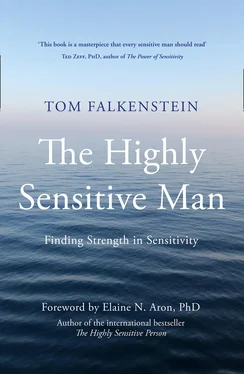The central nervous system was also seen as being particularly important in understanding the human body at that time, and it was believed that a particularly nervous or sensitive disposition was a clear indication of a noble or educated background and refinement, not a sign of a lack of masculinity. The finer and more sensitive a man’s nervous system was, the better. What we might now call “weak nerves” used to be something that was valued.
Our understanding of masculinity was, however, profoundly changed by the new focus on productivity and efficiency during the Industrial Revolution and the twentieth century’s two world wars. Since then, open displays of emotion by men, with the exception of anger, have been stigmatized and are commonly seen as something negative and embarrassing. 30
In order for men to assert themselves socially and professionally, it became increasingly important in the Western world for them to develop characteristics such as dominance, independence, and high performance. But as we have seen in this chapter, men have paid a high price for this. The rest of society has paid, too: their partners, their families, their children, their siblings, their parents, and their friends. It has affected all of us.
It goes without saying that when I talk about men as a whole, I am generalizing and simplifying enormously. But let us allow ourselves to do just that for a moment so that we can create a picture of the symbiotic interdependence between the sexes. When the position of women in our society changes—which has particularly been the case since the feminist women’s movement from the 1960s onward—then that has an effect on men and vice versa. A man who finds it difficult to recognize his own emotional needs and feelings, and who cannot express these fully to other people, will find relationships with other people difficult and won’t be able to become an emotionally satisfying or emotionally available partner. A man who primarily defines his own self-worth through his professional success or has learned to only express emotional intimacy through his sexuality is just as problematic. Both of these personality aspects will have negative outcomes on his partners, his family, his relationships, his health, and his whole community. It is therefore in the interest of both men and women that men are better able to free themselves from the traditional values of masculinity. This will allow men to open up emotionally, to be seen as multifaceted, to be vulnerable, and to show their emotions without being scared of being shamed for being a “wimp” or a “sissy.” Men and women both profit when they are able to live fully as complete equals—free, autonomous, self-confident, multilayered, and multifaceted, with space for personal growth.
Male Emancipation
So what might male emancipation look like? I don’t believe that all men have to become more sensitive or somehow soften their appearance or their nature, nor do I think that we should be aiming to return to a Georgian ideal of masculinity that values the particular traits of the highly sensitive man. What I do believe is that we need to expand our idea of what masculinity can be and feel able to define it more freely, so that it includes every man and boy as he is, encompassing all of his unique facets, complexities, and contradictions. We need to stop reducing ourselves and being reduced by others. We need to stop seeing everything as black and white and start seeing the great spectrum of shades that exists among men. We need to stop saying “either-or” and start saying “as well as.” Masculine and sensitive, masculine and emotional. And the more that the highly sensitive man is able to deal with and thrive with his high sensitivity, to live with it with more self-confidence, more self-awareness, and more authenticity in the eyes of others, the more he can drive this social change.
If we are going to talk about a crisis of masculinity, then we have to see this crisis as an opportunity. An opportunity for change. Through the process of coming to terms with ourselves, we begin to ask questions and to define things in new ways, which, in turn, changes people’s thinking, their attitudes, and their behavior. This process can be both frightening and unsettling, but it can also be liberating and exciting. Perhaps it is exactly this process that we can see happening all around us and that will eventually allow men to lead more authentic, intimate, emotional, and sensitive lives.
The clinical psychologist Martin Seager is one of the cofounders of the Male Psychology Network of British physicians and psychologists, which organizes an annual conference on the subject of men’s mental health. Seager is convinced that the traditional rules of masculinity put an enormous amount of pressure on men to think, to feel, and to behave in a certain way. When I talked to him, he summarized for me the rules of masculinity.
1 A real man is a fighter and a winner.
2 A real man is a provider and a protector (of women and children).
3 A real man is controlled and disciplined.
Seager doesn’t believe that these social expectations will completely disappear, but he does have the impression that society is currently in the process of changing and broadening the application and the content of these rules. What does this process look like? Well, providing for others could also mean providing for them at an emotional level, instead of just a financial and physical one. These are all important and legitimate ways of being a provider. A man could look after his partner by trying to be emotionally present and available. He could share childcare, which also represents a form of masculine provision and masculine protection. If society as a whole (and men themselves) expects men to fight and to win, then we could also broaden our definition of what that means. What might a contemporary form of masculine fighting look like in the twenty-first century? How about fighting for something that matters to you or fighting for a good cause? How about fighting for your family or your relationship? And could success also mean having close and emotionally satisfying relationships with other people, leading a long psychologically and physically healthy life, and having a career that gives your life meaning? If the only definition of success is status, if professional and sexual success only relates to material wealth, then that can only lead to a situation in which most of us don’t feel successful and our attempts to become real men in our society are going to falter and eventually fail.
To redefine these rules, however, men also need the support of women who allow them to be who they are. And they need the support of other men who treat them with warmth and acceptance and in doing so enable this emancipation from the narrow rules of masculinity.
SUMMARY
This is what the emancipation of men, which, to my mind, is long overdue, could look like. And what could it feel like? How about friendly, fatherly, brotherly, benevolent, accepting, equal, communal, generous, caring, and liberating? Both to ourselves and to others. Including instead of excluding. What would happen if men started to take more notice of their emotional needs and to verbalize them? If they showed the full spectrum of their feelings, not just anger and rage but also loneliness, sadness, helplessness, joy, and excitement? If our society was completely open to boys and men being emotional and sensitive and saw these qualities as something attractive and masculine? Just imagine if men were able to steadily free themselves from the strict categories of what is typically masculine and typically feminine and be less defined by them?
What would change in your friendships, in your relationships, in the way that you parent, in the career that you choose? The aim wouldn’t be to become more feminine or to sweep aside any differences between men and women; that would be neither possible nor desirable. The aim would be to feel freer and lighter, to throw off that heavy old armor.
Читать дальше












